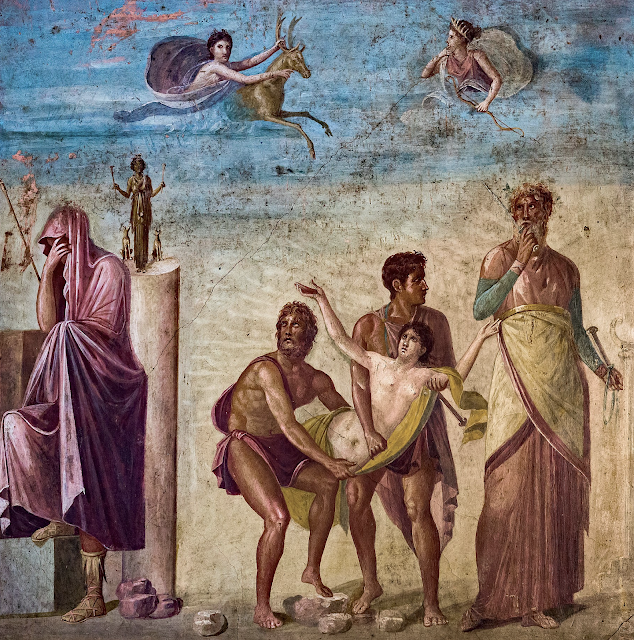Gluck - Iphigénie en Aulide and Iphigénie en Tauride
La Monnaie, Brussels, Sunday December 6 2009.
Conductor: Christophe Rousset. Production: Pierre Audi. Dramaturge: Klaus Bertisch. Sets: Michael Simon. Costumes: Anna Eiermann. Lighting: Jean Kalman.
En Aulide: Agamemnon: Andrew Schroeder. Clytemnestre: Charlotte Hellekant. Iphigénie: Véronique Gens. Achille: Avi Klemberg. Patrocle: Henk Neven. Calchas: Gilles Cachemaille. Arcas: Werner Van Mechelen. Diane: Violet Serena Noorduyn.
En Tauride: Iphigénie: Nadja Michael. Oreste: Stéphane Degout. Pylade: Topi Lehtipuu. Thoas: Werner Van Mechelen. Diane: Violet Serena Noorduyn.
Orchestra and chorus of La Monnaie.
Bad Gluck can be very tedious. Two in a row would be a serious trial, so I had misgivings at finding both Iphigénies scheduled together this season. But when the singing and acting are first rate we are reminded what a great composer of musical tragedy Gluck is. Topi Lehtipuu and Stéphane Degout must be today’s ideal pairing as Pylade and Oreste. Lehtipuu is, as anyone familiar with the DVD of Les Paladins knows, one of the best available high French (albeit Finnish) tenors. Degout is one of France’s best middleweight baritones. Together they sang and acted magnificently and movingly, forming a great dramatic trio with Nadja Michael. She was Medea in La Monnaie’s Warlikowski production that I sadly missed. The critics have not been too keen on her Iphigénie (in part on account of her plummy diction: not a single “s” is heard) but I admired her commitment and – when she turned it up – surprising volume for such a slight figure.
The second part of the afternoon was, therefore, gripping. The first half was less so, with a more variable cast. Avi Klemberg made an unheroic Achille, partly because the production had him so and partly because his voice was feeble. Gilles Cachemaille’s voice is now partly over the hill. I was more interested in Charlotte Hellekant’s vehement Clytemnestre, despite her weak French. The critics' choice (the audience’s too, by the sound of the applause) was Véronique Gens; her voice sounded silvery and sweet and her French was of course perfect, but from where I sat at the front of the second balcony, the stage arrangement meant it tended to get lost “downstairs.” I’ll explain…
There’s a certain gentle, reasonable, noble simplicity, or simple nobility, about Gluck that calls, I think, for simple stagings. In any case, when his works are raised to the level of Sunday’s Tauride, they hardly need staging at all. As I mentioned, the acting in Pierre Audi’s production was excellent and committed; the staging was, however, something like taking a sledgehammer to crack a nut (in this case, a very good nut indeed).
Audi went to all the trouble of turning La Monnaie into a theatre in the round – a curious thing to do when, in Brussels, the opera sometimes decamps to the Royal Circus (as last season for Lucia) which is in the round anyway. The square stage, set askew, was where the pit usually is, the orchestra was on stage and there were rows of seats rising up at the rear for the chorus and part of the audience. An elaborate arrangement of scaffolding, at all angles like a game of spillikins, held up steel staircases and platforms leading out from the stage-side boxes and arched over the new stage – for Aulide bearing a “cloud” of silver mesh. In other words, a gigantic structure, swamping the action and pushing the singers well forward into the auditorium, which is why some voices didn’t quite make it up to the second balcony, as mentioned above.
The overall atmosphere was of countries at war, which is legitimate enough. And soldiers in full camouflage battledress, boots and balaclavas, though we’ve seen them often enough, can still work well in the right hands (e.g. Sellars’); but they risk being déjà vu and here were simply irrelevant, adding nothing. (Even Clytemnestre’s trained evening gown was in camouflage print, by the way, an odd touch.) In Tauride, perhaps inspired by the quirky “Turkish” chorus “Les dieux apaisent leur courroux,” the soldiers were got up like extras from a very low-budget spin-off of Mad Max: long hair, big sunglasses and Gautier kilts (Thoas was our old "friend" the corrupt and lubricious police chief). Iphigénie and her fellow pristesses wore Playtex-pink shifts, buttoning on pink housecoats and taking up axes when sacrifice was in the air. Characters climbed up and down the steel stairs, and Diane prowled slowly around whether required to by the score or not – at one stage equipped with another very déjà vu item, a single white wing strapped to her right arm and wielded hieratically.
“Trop compliqué” was something I heard more than once during the interval, and the critics seemed to agree. This was an afternoon of excellently played Gluck, far better heard (under Christophe Rousset, characteristically bouncy and energetic with some very zippy tempi) than seen.




I found your blog while looking for reviews of Topi Lehtipuu's performances. I have been enjoying your witty and informative commentaries since then.
ReplyDeleteWhat drove me to break my silence is the picture on your face book. It is a scream! I laughed so hard that I almost spilled my coffee. The picture could use a caption though. I humbly suggest: From Here to Eternity--A Pilgrim's Progress.
Greetings from a southern state in the US.
You're very kind. But once again, I'm amazed people find and read this thing...
ReplyDelete